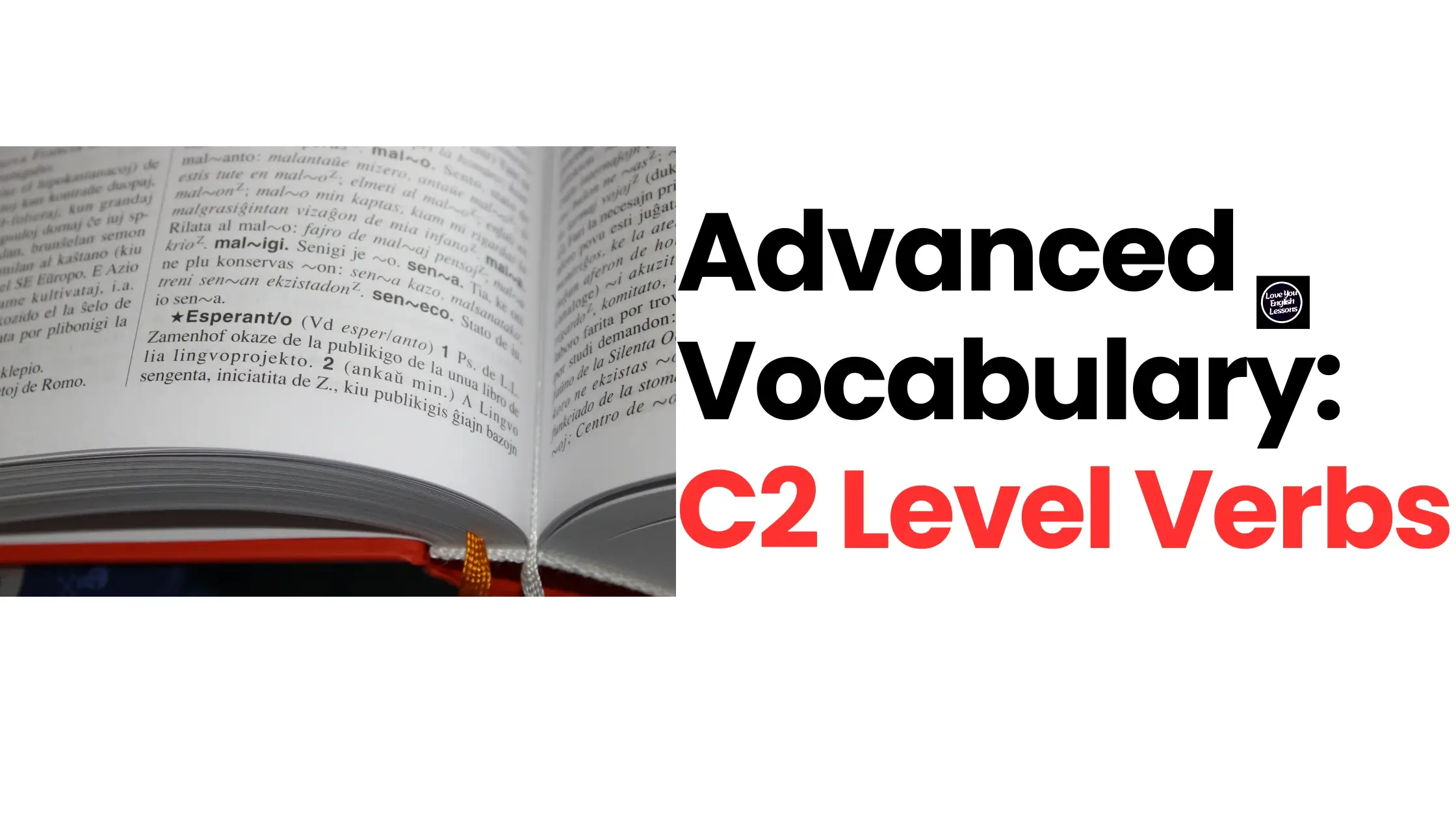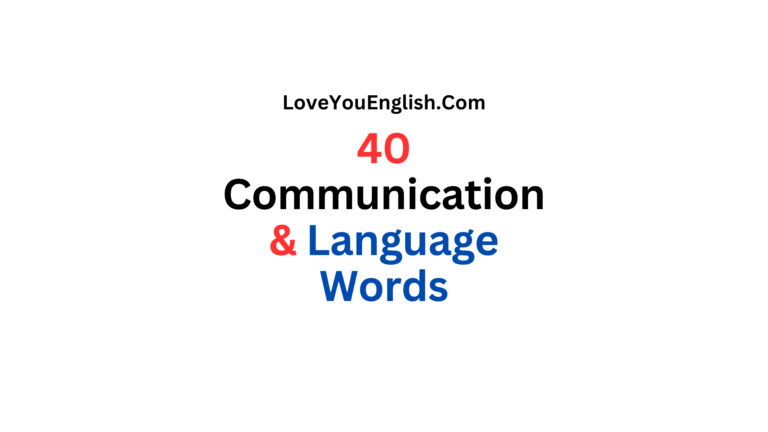Advanced Vocabulary: C2 Level Verbs
I’m sure you relish learning new vocabulary, and in today’s lesson I want to teach you some advanced C2 verbs.
And because I just mentioned it, let’s begin with the verb to relish what this means is to like or enjoy something.
And really, you’re just adding a bit of emphasis. As I just said, I’m sure you relish learning new vocabulary, you enjoy it, and you know that you’re enjoying it.
And you can follow this verb with either a gerund or a noun. So, to give you a couple of examples with gerunds, I could say I relish travelling to exotic locations.
Or I relish eating ice cream on a hot summer day, and then if you’re going to follow it with a noun, there are some common collocations.
And these are words that are frequently used together. So, you may relish the thought, prospect, or idea of doing something. Or you may relish the chance or the opportunity to do something.
Also read:
- English Phrasal Verbs with “Bring” Along with Meanings
- What are phrasal verbs and how do you use them?
- Six Things You Need to Know About Phrasal Verbs
- What Are Phrasal Verbs? A Guide to Understanding Their Usage
She won’t survive. I don’t relish hurting anyone, Peter, but she’s not a child.
Well, Deepika relishes her status as Queen Bee, right? pathologically. And if you are someone who relishes learning new vocabulary, please follow me for more.
Coincide
This verb has two meanings. The first one is to happen at or near the same time, and often you’re going to follow the verb with the preposition with.
So, you would say that something coincides with something else. And you’re not really talking about everyday activities like going to the coffee shop coincides with this. You’re talking about events that may not occur regularly.
I could say, look, I’m sorry, I can’t go to your birthday party because it coincides with a business trip that I have to take.
It’s happening at the same time. It also means to be the same or similar. So, I could say if our schedules coincide, then we can plan to travel together. We’ll take the train.
Squander
And then we have the verb squander. I like this verb even though it has a negative connotation because it means to waste money or supplies or to waste opportunities by not taking advantage of them.
In India, which is where I am from, I could say many people feel that the government squanders taxpayer money and they just waste that money.
You may also hear people use this in a statement and say, hey, don’t squander this opportunity. That is a collocation to squander an opportunity.
Commemorate
And this means to remember officially and give respect to a great person or event, especially by some public ceremony or by making a statue or a special building.
And I thought that I would show you some different news headlines so that you can see how this verb is used in context.
- On Veterans Day, flags are lowered at half-staff to commemorate the sacrifices of the nation’s military members.
- Every year we commemorate our country’s independence with huge fireworks display in the town square.
- All players will receive a championship ring to commemorate the team’s amazing season.
- While Jared is at the football game, we will bake a huge cake to commemorate his birthday.
- The legislators have approved a holiday to commemorate the life of the civil rights leader.
These are just some random news headlines that I found on the web.
In context, hopefully that gives you a better understanding.
Gasp
And it has two different meanings. And it’s really a difference between talking about, well, one breath or many breaths. The first meaning is to take a short, quick breath through the mouth because of shock, pain or surprise.
It’s just that one breath gasp and people may use this as an interjection and saying something surprising like and he never returned home and saw his family gasp. It’s used in storytelling with those dialogue tags to describe speaking. Help me, he gasped.
It also means to breathe loudly and with difficulty, really trying to get more air. And in this case, it’s several breaths, and often people may end up using it in the continuous tense, gasping.
I could say that the wave knocked me over and I was gasping for air. That is a common collocation with this verb, to say that someone is gasping for air.
Intervene
And this means to intentionally become involved in a situation in order to improve it or just prevent it from getting worse. If there is an argument or a fight, someone may intervene.
I could say that the referee intervenes to stop the fight, they just did not want it to get worse.
I could also say the Federal Reserve has intervened in financial markets in order to stop inflation. They’re getting involved in the situation to try to improve it.
Label
This refers to a word or phrase that’s used to describe the characteristics or qualities of a person, event, or thing. And really, in a way, that’s unfair. So, you may label someone as something.
That is a common phrase to label someone as something. In my lifetime, I have been labeled as a troublemaker.
At school, when I was younger, I’ve also been labeled as a slacker, which is a noun that means someone who does not work very hard.
And of course, I would disagree with this, but it happens if we get the wrong impression of someone or something, and we may label them as this thing which is usually negative.
They impose struggle and hardship on us. They labeled us as criminals for pushing back. The mortgage officer had messed up Kareena’s application. They had inadvertently labeled her as separated.
Imply
This is a very useful verb. It means to communicate an idea or feeling without directly saying it. And because you’re not directly saying it, people may use this verb.
When asking a question and they would ask what are you implying?
I’m going to give you an example, I’m going to imply something without directly saying it, and I just want you to think about what it is that I’m implying.
So, if I said, gosh, I really hope that you like this video lesson and when I say like I’m talking about, enjoy that, you relish learning new vocabulary and if only there were some ways for you to commemorate this lesson so that it gets labeled as a great vocabulary lesson and now I’m using it in a positive way, it gets labeled as a great lesson.
If there was just something that you could do to commemorate this lesson, just follow me because I’m implying that you should share it with your friends and fellow learners.
Infer
This means to form an opinion or guess that something is true based on the information that you have.
So, if you see me and I’m just soaking wet, what might you infer about the weather? I imagine that you would infer that it’s raining outside.
Or maybe you see me and I’m really happy and I’m smiling, grinning from ear to ear. What might you infer? I really don’t know. You can let me know down in the comments.
Speculate
The next verb is to speculate, and I think this is a very useful verb because it’s pretty common. People do this all the time to speculate. It means to guess possible answers to a question when we don’t have enough information to be certain.
So, we do this quite often because, well, I think people just like speculating about different things when trying to explain something that happened.
And we don’t have all the answers. And we may speculate or we’re trying to guess what will happen in the future and we can only speculate.
To give you an example, I could say journalists are speculating what the President may say in her upcoming announcement. And I think in general, it’s, well, it’s not always good to speculate or at least we should tell people that that is what we’re doing because sometimes people will speculate and then others will just take that as the truth, and it can cause some problems.
Succumb
To succumb has two different meanings. And once again, I’ll show you some news headlines so that you can see how this verb is used in context.
So, the first meaning is to lose the determination to oppose something and really, you’re just accepting defeat.
Visit these popular tourist traps before they succumb to climate change.
This is how Israel’s economy could succumb to populism. Samsung is first to succumb to a slowing economy that is crushing semiconductors.
The next meaning is to die or suffer badly from an illness or injury.
Battling Morocco eventually succumb to injuries. And in this case, they’re talking about their football team to succumb to injuries sustained after falling from mobile tower.
Trudge
To trudge means to walk slowly with a lot of effort, especially over a difficult surface or wind carrying something heavy.
And often you may follow this verb with a preposition.
Trudge up, trudge down, trudge over, trudge through.
Maybe you had to trudge up a mountain, or perhaps you had to trudge through the snow. And in both situations, you’re walking slowly with a lot of effort.
Let’s do a little review. Now, I am not going to speculate as to whether or not you will read another lesson.
I’m sure that you relish building your vocabulary and because you’re still here right now, then I’m just going to infer that you will watch another video lesson because I don’t think you want to squander this amazing opportunity.
To continue improving your overall English fluency I really don’t want you to succumb to any feelings of inadequacy when it comes to your language abilities.
I want you to stay positive, I want you to stay motivated, and I want you to continue learning new things.
All right, that’s a little review using these verbs in context. If you enjoyed the lesson, let me know in the comment section.
_________________________
Check out these awesome vocabulary books I recommend:







